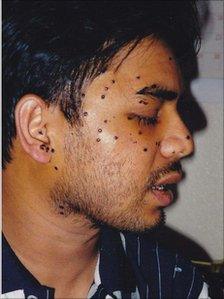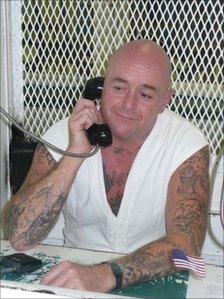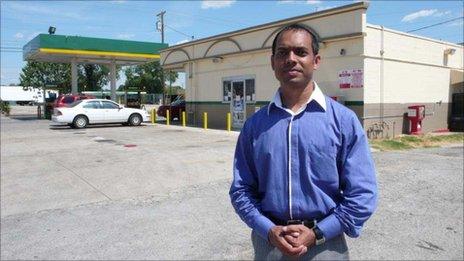Texas death row killer forgiven by shooting victim
- Published
Mark Stroman describes hate as pure ignorance
In the nine years Mark Stroman has been on death row in Texas, he says he has watched 208 people walk past him on the way to be executed.
This week it is his turn.
But fighting to save his life is the man he shot in the face and blinded in one eye.
In the days following 11 September, 2001, Stroman attacked three people, killing two of them.

The attack left Rais Bhuyian blind in his right eye
He was targeting anyone he considered an "Arab", calling it revenge for 9/11.
"What Mark Stroman did was a hate crime, and hate crimes come from ignorance," said Rais Bhuiyan, 37, the only man to survive the shooting.
"His execution will not eradicate hate crimes from this world, we will just simply lose another human life."
'Uneducated idiot'
It was a Friday lunchtime when a gunman walked into the petrol station shop and pointed a double-barrelled shotgun at Rais.
He had been robbed before and knew what to do. He offered the money from the cash register, but that didn't appear to be what Mark Stroman had come for.
"He asked me 'where are you from?' and that's a strange question to ask in a robbery. As soon as I said 'excuse me?' I heard an explosion and felt the sensation of a million bees stinging my face."
Rais Bhuyian, a Bangladeshi-born naturalised US citizen, played dead until his attacker left.
He needed many operations, has lost the sight in his right eye and still carries shotgun pellets in his face, but is now campaigning hard to prevent his attacker from being put to death.
Mark Stroman killed two other men in a similar way - Vasudev Patel, an Indian immigrant who was Hindu, and Waqar Hasan, a Muslim born in Pakistan. They were both shot as they stood behind a counter.
"I was an uneducated idiot back then and now I'm a more understanding human being," Stroman said through the black telephone handset, from behind a thick pane of glass in the death row visiting room at the Polunsky Unit, Livingston, Texas.
It was a week before the death sentence was due to be carried out, and his last opportunity to speak publicly about what he did, why he did it, and what he thought about the man he shot who was now fighting for his life.
"At that time here in America everybody was saying 'let's get them' - we didn't know who to get, we were just stereotyping. I stereotyped all Muslims as terrorists and that was wrong."
Stroman is shaven-headed and covered in tattoos. He made a point of putting up a small American flag on the counter behind the thick glass as the camera started rolling for the interview.

Mark Stroman is due to be put to death by lethal injection
At 41, he has lost some of the muscle he had when he appeared in court nine years ago, when he proudly held up an American flag and gave the thumbs up to the courtroom cameras.
"I had some poor upbringing and I grabbed a hold of some ideas which was ignorance, you know, and hate is pure ignorance. I no longer want to be like hate, I want to be like me," he said.
"No matter what I do or say is going to change the fact that even you are going to view the Muslims as suspect," he told me.
"If you get on the airplane and you see one, you might not be wanting to, but you are going to watch that person - we live in different times now, but it's not right to stereotype them and I'm the first to admit I did that."
Offering forgiveness
Rais Bhuyian is a Muslim, and on what he feared was his deathbed, he promised Allah he would make a pilgrimage to the Hajj in Mecca. There he thought more deeply about what had happened and what he wanted to do.
"This campaign is all about passion, forgiveness, tolerance and healing. We should not stay in the past, we must move forward," he said.
"If I can forgive my offender who tried to take my life, we can all work together to forgive each other and move forward and take a new narrative on the 10th anniversary of 11 September."
He had been in touch with Stroman, who he would like to see as "a spokesperson, an educator, teaching a lot of people as ignorant as him what is wrong".
Stroman says he has asked himself the question a thousand times - would he be able to forgive the man who shot him in the face? He said he would find it very hard.
"I tried to kill this man, and this man is now trying to save my life. This man is inspiring to me.

Rais Bhuiyan says Stroman could have a role as an 'educator'
"Here it is, the attacker and the attackee, you know, pulling together. The hate has to stop - one second of hate will cause a lifetime of misery. I've done that - it's wrong, and if me and Rais can reach one person, mission accomplished.
"If this is what my purpose in life is, let's do it - rock on, saddle up it's rodeo time as we say in Texas."
It seems very unlikely that the governor of Texas will issue a stay of execution - the state is known for its regular use of the death penalty - but Stroman seems resigned to it.
"To be honest, the closer I get to death the more at peace I am," he said.
Rais Bhuiyan's desire to forgive and to stop this execution is a small step towards bringing communities together.
"He did what he did, but now he is a different person, and can talk to the people - those who are as ignorant as him - so there is a chance we can live in a better society. Execution is not a solution in this case."
Mark Stroman is due to be put to death by lethal injection on Wednesday 20 July at 1800 Texas time (0000 GMT on Thursday).